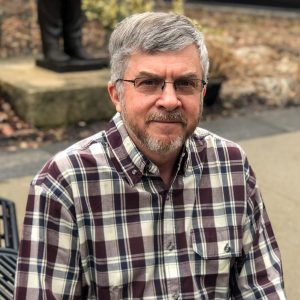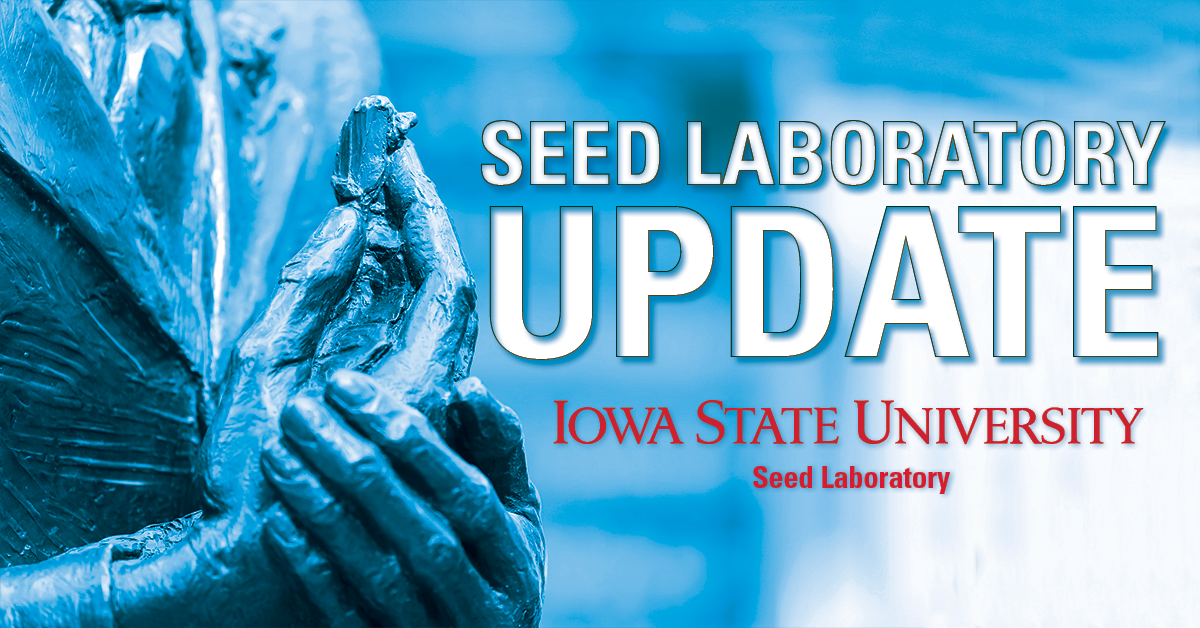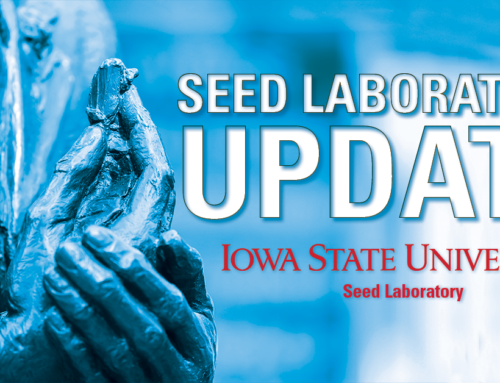 It was November 1979 when seed scientist and erstwhile Seed Science Center director Dr. Leroy Everson hired the current manager of Iowa State University’s Seed Laboratory, Michael “Mike” Stahr, as a student seed analyst. Little did he know that this undergraduate adventure would lead to a career that would span nearly 45 years.
It was November 1979 when seed scientist and erstwhile Seed Science Center director Dr. Leroy Everson hired the current manager of Iowa State University’s Seed Laboratory, Michael “Mike” Stahr, as a student seed analyst. Little did he know that this undergraduate adventure would lead to a career that would span nearly 45 years.
Mike’s passion for seeds stems from his love of agriculture, which is in his DNA. His parents both grew up on farms and moved to Iowa when Mike was but a child. The family started farming in 1969 near Ogden where Mike’s paternal grandparents soon joined them.
“We had our own Living History Farm as we harvested corn by hand and put loose hay in the hayloft,” Mike said. “I married a farmer’s daughter and have been privileged to assist my in-laws in farming for over 40 years. Julie and I still live on the farm just south of Boone that has been in her family since around 1845.”
Dating back more than 100 years, ISU’s Seed Laboratory, part of the Seed Science Center (SSC), is now the largest public seed testing laboratory in the world, home to faculty and staff certified in purity, germination, seed health, and the testing of biotech traits. Under Mike’s leadership, the Seed Lab tests a minimum of 24 million seeds per year (which equates to thousands of seed samples) of more than 300 species of crops, vegetables, and flowers.
“Mike has a wealth of technical expertise in seed testing. His expertise was recognized at the highest level when he was elected to serve as president of the Association of Official Seed Analysts (AOSA) twice,” said Dr. Manjit Misra, now head of USDA’s National Institute for Food and Agriculture. AOSA is an organization of state, federal, and university laboratories in the U.S. and Canada that develops rules and procedures for seed testing and standardization. Before taking on his current role, Misra served as SSC director, under whom Mike spent much of his career. “Mike’s technical expertise, combined with his dedication to customer service, contributed significantly to the success of the Seed Lab.”
After working at the SSC as a student, Mike became a full-time seed analyst in 1981, working his way up to become manager of the Seed Lab in 2007. Stahrs have worked for Iowa State since 1969, starting with his dad being a professor at the Veterinary Diagnostic Lab, then Mike and now son Jeremy at Laboratory Animal Resources and nephew Isaac at Information Technology Services.
Mike earned a BBA degree in behavioral management and his MS degree in Agronomy (with specialization in Crop Production) from Iowa State. He is a Certified Seed Analyst (CSA) in germination and holds another certificate as a Genetic Technologist in herbicide bioassay and immunoassay from the Society of Commercial Seed Technologists (SCST). He has been active in these two organizations, serving two terms as AOSA president and another two terms as the Association’s vice president. He chaired the following committees: Rules, Herbicide s, & Vigor. He was also twice a member of SCST’s Executive Board and its Genetic Board of Examiners. He also chaired the Society’s Genetic Technology Committee and Herbicide Bioassay working group and was co-founder and organizer of SCST’s week-long Genetic Testing Super Workshop, which has been held every other year since 2004. Mike authored the (GMO) Trait section of the AOSA Cultivar Purity Testing Handbook and wrote updates of the Seed Vigor Testing and Herbicide Trait Testing sections of the SCST Seed Technologist Training Manual.
For his outstanding contributions, Mike was presented with AOSA’s prestigious Merit Award in 2015. Past winners include author and renowned horticulturist Dr. Miller McDonald of Ohio State, distance education expert Dr. Loren Wiesner of Colorado State, and Iowa State’s Dr. Leroy Everson, a recognized leader in standardizing and improving seed testing methodologies. In 2020 SCST presented Mike with its Meritorious Service Award.
“Since 1908, AOSA confers only one award a year. I am thus one of its relatively small group of recipients,” Mike said. “I am pleased and humbled to be in such good company.”
Mike’s responsibilities at the SSC include teaching portions of workshops and short courses since 1990. He also had a hand in the conducting of the Center’s global programs, having twice taught seed testing workshops in Kenya and assisted in designing and equipping three government seed labs in northern Ghana.
Over the years, Mike and Seed Lab colleagues have mentored hundreds of student workers, many of whom are now serving significant roles throughout the agriculture industry.
“Students who serve as testing assistants or interns in the Seed Lab learn the value of credible seed testing and analysis through hands-on training,” said Dr. Lulu Rodriguez, interim director of the SSC. “They come from different backgrounds and technical disciplines. At the SSC, they learn how to become strong team members and often go on to become industry leaders.”
Mike encourages his staff to continue their education as well as receive training and certifications that will further their careers. But much of his success comes from his “hands-on” management style. He enjoys sharing the workload with faculty, students, and staff.
“While working on my Bachelor of Business Administration degree in Management, I learned that in Japan, management-level employees are required to ‘work the floor’ at least once a year to keep in touch with what the company produces and what workers do,” Mike recalls. “It made such an impression on me that I have never asked—and will never ask—anyone to do anything I wouldn’t gladly do myself.”
Stahr’s last day of work is Friday, December 29, 2023. In his honor, a retirement reception will be held on Wednesday, December 20, 2-4pm at the Seed Science Center, 2115 Osborn Drive.


